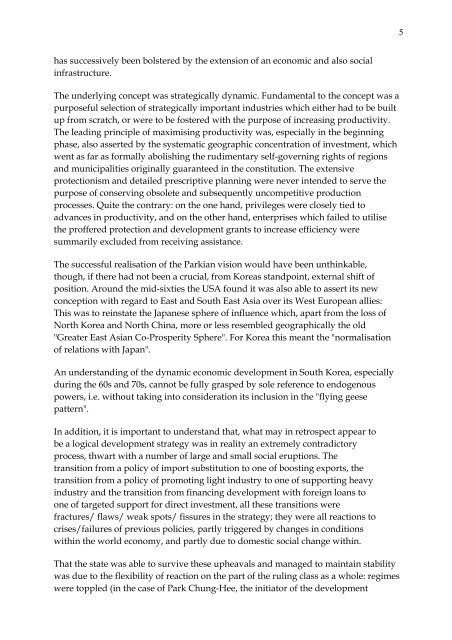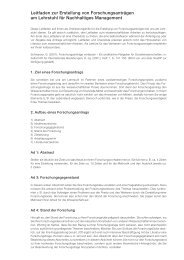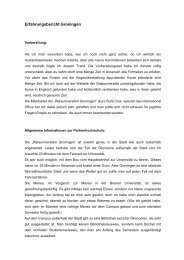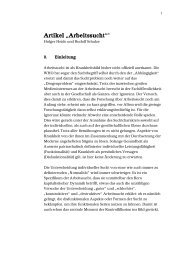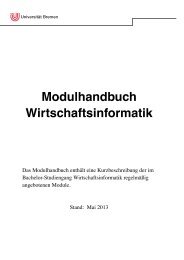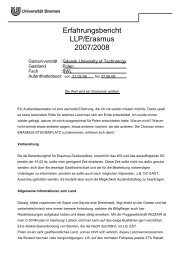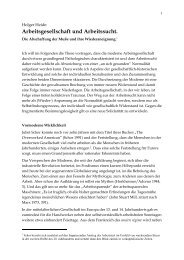Holger Heide Schumpeterian Dynamics in Crisis - Universität Bremen
Holger Heide Schumpeterian Dynamics in Crisis - Universität Bremen
Holger Heide Schumpeterian Dynamics in Crisis - Universität Bremen
Create successful ePaper yourself
Turn your PDF publications into a flip-book with our unique Google optimized e-Paper software.
5<br />
has successively been bolstered by the extension of an economic and also social<br />
<strong>in</strong>frastructure.<br />
The underly<strong>in</strong>g concept was strategically dynamic. Fundamental to the concept was a<br />
purposeful selection of strategically important <strong>in</strong>dustries which either had to be built<br />
up from scratch, or were to be fostered with the purpose of <strong>in</strong>creas<strong>in</strong>g productivity.<br />
The lead<strong>in</strong>g pr<strong>in</strong>ciple of maximis<strong>in</strong>g productivity was, especially <strong>in</strong> the beg<strong>in</strong>n<strong>in</strong>g<br />
phase, also asserted by the systematic geographic concentration of <strong>in</strong>vestment, which<br />
went as far as formally abolish<strong>in</strong>g the rudimentary self-govern<strong>in</strong>g rights of regions<br />
and municipalities orig<strong>in</strong>ally guaranteed <strong>in</strong> the constitution. The extensive<br />
protectionism and detailed prescriptive plann<strong>in</strong>g were never <strong>in</strong>tended to serve the<br />
purpose of conserv<strong>in</strong>g obsolete and subsequently uncompetitive production<br />
processes. Quite the contrary: on the one hand, privileges were closely tied to<br />
advances <strong>in</strong> productivity, and on the other hand, enterprises which failed to utilise<br />
the proffered protection and development grants to <strong>in</strong>crease efficiency were<br />
summarily excluded from receiv<strong>in</strong>g assistance.<br />
The successful realisation of the Parkian vision would have been unth<strong>in</strong>kable,<br />
though, if there had not been a crucial, from Koreas standpo<strong>in</strong>t, external shift of<br />
position. Around the mid-sixties the USA found it was also able to assert its new<br />
conception with regard to East and South East Asia over its West European allies:<br />
This was to re<strong>in</strong>state the Japanese sphere of <strong>in</strong>fluence which, apart from the loss of<br />
North Korea and North Ch<strong>in</strong>a, more or less resembled geographically the old<br />
"Greater East Asian Co-Prosperity Sphere". For Korea this meant the "normalisation<br />
of relations with Japan".<br />
An understand<strong>in</strong>g of the dynamic economic development <strong>in</strong> South Korea, especially<br />
dur<strong>in</strong>g the 60s and 70s, cannot be fully grasped by sole reference to endogenous<br />
powers, i.e. without tak<strong>in</strong>g <strong>in</strong>to consideration its <strong>in</strong>clusion <strong>in</strong> the "fly<strong>in</strong>g geese<br />
pattern".<br />
In addition, it is important to understand that, what may <strong>in</strong> retrospect appear to<br />
be a logical development strategy was <strong>in</strong> reality an extremely contradictory<br />
process, thwart with a number of large and small social eruptions. The<br />
transition from a policy of import substitution to one of boost<strong>in</strong>g exports, the<br />
transition from a policy of promot<strong>in</strong>g light <strong>in</strong>dustry to one of support<strong>in</strong>g heavy<br />
<strong>in</strong>dustry and the transition from f<strong>in</strong>anc<strong>in</strong>g development with foreign loans to<br />
one of targeted support for direct <strong>in</strong>vestment, all these transitions were<br />
fractures/ flaws/ weak spots/ fissures <strong>in</strong> the strategy; they were all reactions to<br />
crises/failures of previous policies, partly triggered by changes <strong>in</strong> conditions<br />
with<strong>in</strong> the world economy, and partly due to domestic social change with<strong>in</strong>.<br />
That the state was able to survive these upheavals and managed to ma<strong>in</strong>ta<strong>in</strong> stability<br />
was due to the flexibility of reaction on the part of the rul<strong>in</strong>g class as a whole: regimes<br />
were toppled (<strong>in</strong> the case of Park Chung-Hee, the <strong>in</strong>itiator of the development


